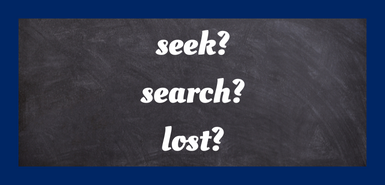The words search, seek and look are very similar but there are slight differences in the meanings of the words and their usage.
Here is a guide to the three words to help you know when to use which word.
Here is a guide to the three words to help you know when to use which word.
- You search the web (The Internet)
- You search ON the Internet.
- You search IN a book, magazine, or newspaper.
- You search ON a page.
- He is searching for the meaning of life.
- She is searching for inner peace.
- thrill-seeker
- attention-seeker
- drug-seeker
SEARCH (Informal)
"Search" - means to
examine a place, something or someone because you want to find something or
someone.
You can search someone. Example: The police searched the suspect for the weapon.
You can search a location or place. Example: The police searched the barn for the missing teenagers.
Search - Phrasal Verbs
"Search" is commonly used with the preposition for. To search for something means to look for something that is missing - it implies a physical, material object. You usually search for something that is tangible (a concrete noun).
Example: I searched for my missing car keys. (The use of the past tense indicates that the item, the car keys, were missing.)
You can search for
something in a specific place. Example: I searched for my mobile phone in my handbag.
You can search through files, papers (groups of items). Example: I searched through my computer files until I found the document I needed.
You can search out something. Example: He searched out the hospital records for the
patient.
You can be in search of something. Example: I am in search of a place to stay tonight. Can you direct me to a good hotel?
Exclusive uses of the word "search"
There are instances
when the word "search" is exclusively used and often with a specific
preposition. Common examples are:
"Search" might
sometimes be used in reference to abstract concepts. Here are some examples:
SEEK (Formal)
"Seek" means to try to
find something or get something. It is
more commonly used in relation to abstract nouns, such as ideas or concepts. Here are some
examples:
If your symptoms do
not improve, seek medical advice.
In an emergency, seek
help immediately.
The lady was forced
to seek assistance from her neighbour.
A baby will seek
comfort from its mother.
The anxious patient
tried to seek reassurance from the doctor that there was nothing seriously
wrong.
Refugees will try to
seek asylum in a safe country.
The young man was
seeking a new job.
The restaurant was
seeking ways to get more customers.
"Seek" may be used
with the preposition out. Example: The man sought out
his missing passport before he left the house.
Some fixed phrases
that exclusively use "seek" are:
"Seek" can also mean
to ask for something. Here are some examples:
I tried to seek
permission from my parents to go to the cinema with my friends.
The child sought its
mother's approval by being very well-behaved.
LOOK (Informal)
When "look" is used
with FOR it means to search for something - usually something that is missing,
needed or desired. It is mainly used for
tangible, physical objects.
I am looking for my
spectacles. Have you seen them? (The spectacles are missing.)
I am looking for the
toilet. (The toilet is needed.)
I am looking for an
interesting place to visit. (The place
is desired.)
Lots of people are
looking for a job in the media at the moment. (A job is desired/needed.)
Vocabulary - Search, Seek & Look - A Guide
Vocabulary - Search, Seek & Look - A Guide

Comments
Post a Comment